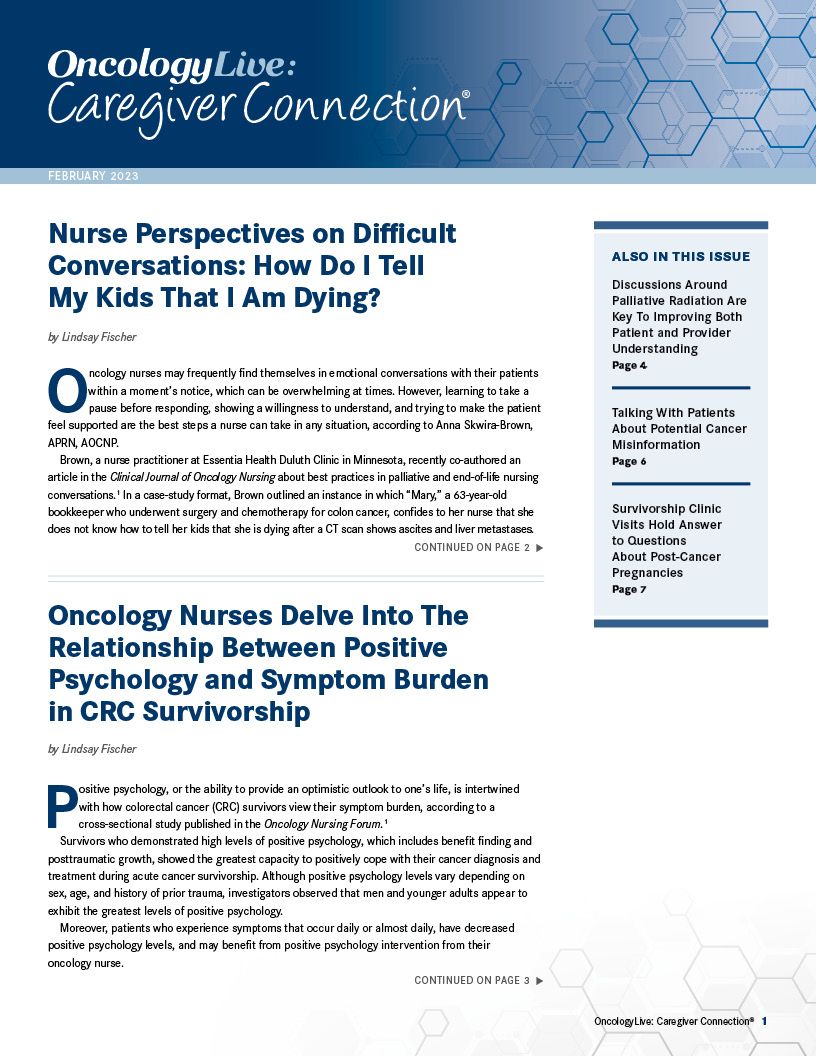Oncology Nurses Delve Into The Relationship Between Positive Psychology and Symptom Burden in CRC Survivorship
A study in the Oncology Nursing Forum highlights which factors are associated with positive psychology and symptom burden in colorectal cancer survivors.
Sameena F. Sheikh-Wu, BA, BSN, RN-BC

Positive psychology, or the ability to provide an optimistic outlook to one’s life, is intertwined with how colorectal cancer (CRC) survivors view their symptom burden, according to a cross-sectional study published in the Oncology Nursing Forum.1
Survivors who demonstrated high levels of positive psychology, which includes benefit finding and posttraumatic growth, showed the greatest capacity to positively cope with their cancer diagnosis and treatment during acute cancer survivorship. Although positive psychology levels vary depending on sex, age, and history of prior trauma, investigators observed that men and younger adults appear to exhibit the greatest levels of positive psychology.
Moreover, patients who experience symptoms that occur daily or almost daily, have decreased positive psychology levels, and may benefit from positive psychology intervention from their oncology nurse.
“Understanding the importance of relationships between positive psychology, symptoms, and health outcomes is important for nurses because nurses are poised to evaluate and monitor for changes in positive psychology and symptoms during acute cancer survivorship,” wrote Sameena F. Sheikh-Wu, PhD, BA, BSN, RN-BC, of the School of Nursing and Health Studies at the University of Miami in Coral Gables, Florida, and co-investigators, in the study. “A better understanding of these relationships can provide the foundation for interventions that increase positive psychology and improve symptom management among CRC survivors across cancer survivorship.”
Investigators conducted a cross-sectional study of 117 CRC survivors who were being treated at the University of Miami between April and August of 2021. Prior to data collection, the investigators collected informed consent and Health Insurance Portability and Accountability Act waivers. Patients who were included in the analysis needed to be age 18 years or older, understand English, have a diagnosis of colon, rectal, or CRC, and be undergoing active treatment. They were not eligible to participate if they had severe mental illness, completed their cancer treatment and were terminally ill or beginning hospice, or if they were unable to give informed consent.1
Overall, 117 survivors completed the study, 77 of whom had colon cancer, 12 of whom had rectal cancer, and 28 of whom had CRC, with cancer stages ranged from I to IV. The mean age was 55.31 years and 44% of participants were female. Prior to their cancer diagnosis, 41% of survivors had experienced a traumatic event; however, there were no differences in demographics or health-related characteristics between those who had or had not experienced prior trauma.
Survivors were asked to complete a demographic questionnaire, the Carver Benefit Finding Scale, and Posttraumatic Growth Inventory to assess positive psychology. A Therapy-Related Symptom Checklist, was also used and considered 49 symptoms using measures such as occurrence, frequency, and severity. When adjusted for the analysis, age was to not be a significant factor symptom burden (P > .05). Sex was a significant factor for hair loss symptoms and abdominal bloating, with women reporting a higher occurrence rate of hair loss (P = .003), and abdominal bloating being more prevalent among men (P = .042).1
Cancer stage played a role in sore vein symptom burden (P = .012) and gastrointestinal pressure (P = .019), higher rates of each were associated with stage III cancer. Moreover, compared with patients undergoing different treatment types, patients who were undergoing chemotherapy reported higher rates of the following symptoms difficulty swallowing, dizziness/lightheadedness, headache, and anal pain (P < .001).
Among patients who experienced a traumatic event prior to their cancer diagnosis (n = 48), the most common symptoms were neuropathy of the hands/feet, feelings of sluggishness, generalized weakness, anxiety, and generalized pain. For those who had never experienced a traumatic event (n = 69), the most common symptoms were neuropathy of the hands/feet, feeling sluggish/fatigue, skin changes (sensitivity, discoloration, texture, and dryness), sleep disturbances, and weight loss. Survivors who had prior traumatic experience reported a higher rate of anxiety (54% vs 31%; P = .011), stress (52% vs 38%; P = .159), and depression (40% vs 22%; P = .047). Of note, 49% of the survivors with prior trauma experience all 3 of these psychological distress symptoms compared with 30% of those who had not experienced prior trauma.
In other cancer populations, patients who demonstrate higher levels of positive psychology have also been observed to experience a reduced burden of psychological distress symptoms, including stress, anxiety, and depression. However, in this study, investigators did not report a relationship between benefit finding, posttraumatic growth, or positive psychology levels, and psychological distress symptoms among the study aggregate.2
Survivors between the ages of 20 and 29 years experienced the highest levels of benefit finding (mean, 4.88), posttraumatic growth (mean, 4.57), and positive psychology (mean = 4.73), while those who were between the ages of 80 and 89 derived the least benefit from benefit finding (mean, 2), posttraumatic growth (mean, 1.76), and positive psychology (mean, 1.88).1
Study authors also observed a relationship between sex and posttraumatic growth levels (P = .023) among those with a prior traumatic event. The mean posttraumatic growth level was 3.09 among men and 2.1 among women. However, among those without a prior traumatic event, the authors observed a significant relationship between sex and benefit finding (P = .031), as well as with posttraumatic growth levels (P = .023) and positive psychology levels (P = .015).
Moreover, an analysis between positive psychology and symptoms characteristics, and psychological distress symptoms, showed that only sportive psychology and symptom frequency were significant. Symptoms that occurred daily were linked with significant decreases in positive psychology levels and symptoms and symptoms that occurred randomly weekly, and almost daily, were not linked to positive psychology levels among survivors without a prior traumatic event.
Reference
- Sheikh-Wu SF, Anglade D, Gattamorta K, Downs CA. The relationship between colorectal cancer survivors’ positive psychology, symptom characteristics, and prior trauma during acute cancer survivorship. Oncol Nurs Forum. 2022;50(1):115-127. doi:10.1188/23.ONF.115-127
- Andrykowski MA, Steffens RF, Bush HM, Tucker TC. Posttraumatic growth and benefit-finding in lung cancer survivors: the benefit of rural residence? J Health Psychol. 2017;22(7):896-905. doi:10.1177/1359105315617820




